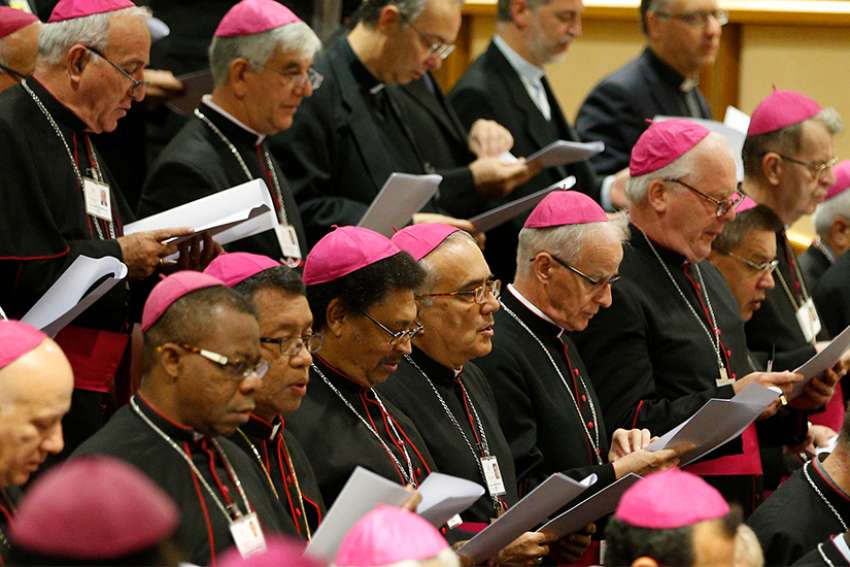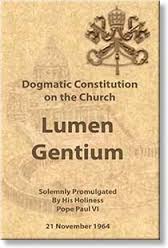
Observations and Thoughts on the New Church Word, “Synodality”
By Figlio della Madonna
Consider the “Synod on Synodality”. The Bergoglian Vatican has provided some information on the “Synodality Spectre”. A key document is the March 2, 2018 document published by the International Theological Commission and entitled, “SYNODALITY IN THE LIFE AND MISSION OF THE CHURCH”. For example, paragraph 6 of this document includes this strange statement: “Although synodality is not explicitly found as a term or as a concept in the teaching of Vatican II, it is fair to say that synodality is at the heart of the work of renewal the Council was encouraging.”
 “Synodality” is a manufactured word and was never used by Pope Paul VI or Pope John Paul II. The Council alternatively referred to itself in the official documents as “This Sacred Council” or “this Sacred Synod” such that one might refer to its documentary output as a matter of “synodality”; yet, the Bergoglian crew seems to use “synodality” with a strangely unwarranted authoritarian, expansive and extravagant, yet ambiguous and imprecise (if not mischievous) meaning and significance.
“Synodality” is a manufactured word and was never used by Pope Paul VI or Pope John Paul II. The Council alternatively referred to itself in the official documents as “This Sacred Council” or “this Sacred Synod” such that one might refer to its documentary output as a matter of “synodality”; yet, the Bergoglian crew seems to use “synodality” with a strangely unwarranted authoritarian, expansive and extravagant, yet ambiguous and imprecise (if not mischievous) meaning and significance.
The post-Vatican II significance of “Synod” – until the novel expression “synodality” was fabricated “whole cloth” by the over-educated heretic, Cardinal Martini, and his Sankt Gallen associates (and then blathered about by the Bergoglian Vatican) – entirely related only to the Pope consulting with the bishops regularly, and it has had absolutely nothing to do with consulting, listening to, or “walking with” laity, whether those laities are Catholics, Christian lay faithful or non–Christians. There are many direct prohibitions against the involvement of non-believers in The Church, and in its governance in particular, let alone in the formulation of doctrines and teaching.
The actual legitimate and particular usage and meaning of “synod” derives from a 1965 Motu Proprio by Pope Paul VI, Apostolica Sollicitudo. While His Holiness references Lumen Gentium in a general manner, his only real citation of authority is an obscure verse from Acts 20, the broader context of which is not so consonant with what Pope Paul VI derived from that single verse; here is the beginning of the Motu Proprio:
“The Apostolic concern leading Us to carefully survey the signs of the times and to make every effort to adapt the means and methods of the holy apostolate to the changing circumstances and need of our day, impels Us to establish even closer ties with the bishops in order to strengthen Our union with them ‘whom the Holy Spirit has placed […] to rule the Church of God’ (Acts 20:28).
We are led to this not merely by the reverence, esteem, and sense of gratitude that We rightly feel towards all Our Venerable Brothers in the episcopate, but also by the very heavy responsibility that has been laid upon Us as universal Shepherd, a responsibility that obliges Us to lead the People of God to eternal pastures. . . .”
There is no reference in this original legislation to the role of anyone outside The Church or to anyone in The Church outside the ordained hierarchy. It’s about regular consultation with the bishops. Period. Lay people are considered merely passive beneficiaries of a Synod.
There is no reference, for example, to “Surprises” from The Holy Spirit in that original document or any other “official” Church document or statement until more than 50 years later during the Bergoglian regime.
(Back to the original Pope Paul VI Motu Proprio!) Here is the R.S.V. version of those versicles in the Acts of the Apostles addressed to disciples (with emphasis on Verse 28 upon which Pope Paul VI placed his sole reliance to institute the ecclesiastical event of a “Synod”, Acts 20:26–32 (R.S.V.):
“Therefore I testify to you this day that I am innocent of the blood of all of you, for I did not shrink from declaring to you the whole counsel of God. Take heed to yourselves and to all the flock, in which the Holy Spirit has made you guardians, to feed the church of the Lord which he obtained with his own blood. I know that after my departure fierce wolves will come in among you, not sparing the flock; and from among your own selves will arise men speaking perverse things, to draw away the disciples after them. Therefore be alert, remembering that for three years I did not cease night or day to admonish every one with tears.
And now I commend you to God and to the word of his grace, which is able to build you up and to give you the inheritance among all those who are sanctified.”
Consider another translation of that single verse upon which Pope Paul VI relied in his simple legislation for a Synod, Acts of the Apostles 20:28 (Douay-Rheims American):
“Take heed to yourselves, and to the whole flock, wherein the Holy Ghost hath placed you bishops, to rule the church of God, which he hath purchased with his own blood.”
In either translation, this single verse is ambiguous, but in no way can it be construed to recommend, let alone, require some haphazard consultation with random Church members or other persons who are not bishops, and especially those who are not Catholics.
Despite no evidence to support it, the International Theological Commission issued its “Synodality in the Life and Mission of The Church” document.
While straining to adhere to magisterial orthodoxy, it is 30 pages in length and projects concepts, interpretations, and lexicon that go far beyond the context and scope of the activity which Pope Paul VI described in Apostolica Sollicitudo. Many of the historical facts the document reports are true, but the document seems to “strain” to place them within a novel context and vocabulary of synodality not heretofore ever expressed that way. Often indicating the pre-eminence of hierarchy, nonetheless, it seems to leave open some mysterious and largely undefined power role for random laity.
Quite frankly. some of the conclusory and sweeping statements of the Theological Commission seem audacious and astounding.
What is attributed to the Second Council of The Vatican in terms of “synodality” goes far beyond any clear statement of magisterial orthodoxy.
 While the Fathers in writing Lumen Gentium used “Sacred Council” interchangeably with “Sacred Synod” to identify that grand assembly, and addressed the issue of “the collegiate character and aspect of the Episcopal order” [Lumen Gentium, #22], there was nothing on the laity as an inchoate normative source of truth, let alone as some genuine fountainhead of doctrinal authority.
While the Fathers in writing Lumen Gentium used “Sacred Council” interchangeably with “Sacred Synod” to identify that grand assembly, and addressed the issue of “the collegiate character and aspect of the Episcopal order” [Lumen Gentium, #22], there was nothing on the laity as an inchoate normative source of truth, let alone as some genuine fountainhead of doctrinal authority.
While it is stated that “the Holy Spirit . . . distributes special graces among the faithful of every rank.” [Lumen Gentium, 12], the Council did nothing to change the definitive role of the Catholic hierarchy: “The bonds which bind men to the Church in a visible way are profession of faith, the sacraments, and ecclesiastical government and communion.” [Lumen Gentium, 14]
This International Theological Commission 2018 document is indeed frightful in its unsubstantiated novelty, at least in part derived from the Sankt Gallen Mafia control group.
For example, what exactly does this mean from ¶ 53 of SYNODALITY IN THE LIFE AND MISSION OF THE CHURCH: “The Church is called, in synodal synergy, to activate the ministries and charisms present in her life and to listen to the voice of the Spirit, in order to discern the ways of evangelisation” ?
“Synergy” (a term from science and social science) normally refers to some kind of productive interaction between and among two or more entities that yields more than what each entity can alone produce. So, who are the entities involved in this “synodal synergy”? Are they public ecclesiastical persons, local churches, individual lay members of The Church [with or without prophetic charisms? and who decides that?], non–Catholics or even non–Christians communicating supposed Divine Counsels of The Holy Spirit which contradict established magisterial orthodox teaching?
 The Theological Commission document, in ¶36, provides an example:
The Theological Commission document, in ¶36, provides an example:
“Synods have always been part of the life of the Anglican Communion on all levels – local, national and international. The expression according to which she is synodically governed, but episcopally led is not meant simply to indicate a division between the legislative power (which belongs to Synods, in which all sectors of the People of God take part) and the executive power (specific to Bishops), but rather the synergy between the charism and personal authority of the Bishop, on the one hand, and, on the other, the gift of the Holy Spirit poured out on the whole community.”
What does that mean? What value does the description of that practice in that English revolutionary and murderous denomination have for Catholics? How would the Catholic Church effectuate, let alone, validate such a ‘synergistic’ phenomenon?
For example, what percentage of the lay Catholics, married and unmarried, engage in conjugal genital relations, acts of marriage, always using artificial contraceptives (approved by the 1930 Lambeth Conference) for “Anglican Communion” members?
How can The Church discern what those millions of contracepting Catholics (putatively ‘dead Members’ of the Mystical Body of Christ?) may claim to receive from The Holy Spirit and seek to insinuate into official synodal input because they claim a “right” to be consulted as a member of “the People of God”?
How about this sentence from ¶ 105 of SYNODALITY IN THE LIFE AND MISSION OF THE CHURCH (Emphasis added.):
“Pastoral conversion for the implementation of synodality means that some paradigms often still present in ecclesiastical culture need to be quashed because they express an understanding of the Church that has not been renewed by the ecclesiology of communion.”
What does that mean? If some heretical nitwit in the hierarchy decides that a particular priest or bishop (who also belongs to the hierarchy) “won’t get with the synodality program”, how might that sentence apply, i.e., how might a “paradigm” get “quashed”? What, in fact, does the word “paradigm” as used in ¶105 of the Theological Commission March 2018 document include?
Consider what one theologian reports on this “paradigm” issue:
The “new paradigm” — although never explicitly saying it — allows priests and bishops simultaneously to affirm that they accept the Church’s moral teaching and yet to liberate “individual consciences” that are not living by that teaching to continue not living by it, while approaching the Table of the Lord.
The “Preparatory Document” entitled For a Synodal Church: Communion, Participation, and Mission is even more ambiguous, confused, and inviting of definitional misconstruction and misunderstanding.
Consider the different meanings of the word “communion” used in varied contexts throughout this document, yet this is a term seemingly and confusingly intended as ambiguously interchangeable, as if there were an identity between and among “the communion of saints”, “Holy Communion” and some novel concept of communion which seemingly extends far beyond Church membership and the Sacraments to an erroneous movement marked by such potential for distortion and institutional destruction. Just one example of the novel secular jargon associated with The Vatican explaining “Synodality”: “106. In the perspective of communion and implementing synodality, some basic lines of orientation in pastoral action can be indicated: . . . e. social diakonia and constructive dialogue with men and women of different religious confessions and convictions in order to bring about together a culture of encounter.”
So, the Synod on Synodality (unlike every real and true previous Synod in history) would insinuate non–Catholics and non–Christians into the event as somehow a matter of “communion”.
Or, consider the frightfully distorted and novel use of the word “conversion”: True and proper conversion is the painful and immensely fruitful passage of leaving one’s own cultural and religious categories.”
It would seem that “Synodality” originated with Cardinal Martini and the Sankt Gallen Mafia, as reported in this article by Corrispondenza Romana.
The real task before anyone who seeks to avoid some evil and inane importation of heresy under the guise of “listening” or “walking” with non–Christians and pseudo–Catholics is to accomplish effective anticipatory pre-emptive messaging which establishes a true narrative about the real potential for evil distortion and mendacious fabrication under the banner of “Synodality”.
Here is a most cogent and coherent Scripture which applies to the specter of “Synodality”:
“Any one who goes ahead and does not abide in the doctrine of Christ does not have God; he who abides in the doctrine has both the Father and the Son.
If any one comes to you and does not bring this doctrine, do not receive him into the house or give him any greeting; for he who greets him shares his wicked work.” [2 John 9–11 (R.S.V.)]
Pending a future reflection on these matters, consider other Sacred Scripture about rebuking error, ignorance, and sin, and keeping the proponents of sin and error away from the Faith community:
“Do you think that I have come to give peace on earth? No, I tell you, but rather division.” [Luke 12:51 (R.S.V.)]
“Do not be conformed to this world but be transformed by the renewal of your mind, that you may prove what is the will of God, what is good and acceptable and perfect.” [Romans 12:2 (R.S.V.)]
“I appeal to you, brethren, to take note of those who create dissensions and difficulties, in opposition to the doctrine which you have been taught; avoid them. For such persons do not serve our Lord Christ, but their own appetites, and by fair and flattering words they deceive the hearts of the simple-minded.” [Romans 16:17–18 (R.S.V.)]
“Do not be deceived: ‘Bad company ruins good morals.’ ” [1 Corinthians 15:33 (R.S.V.)]
“Am I now seeking the favor of men, or of God? Or am I trying to please men? If I were still pleasing men, I should not be a servant of Christ.” [Galatians 1:10 (R.S.V.)]
“So then, brethren, stand firm and hold to the traditions which you were taught by us, either by word of mouth or by letter.” [1 Thessalonians 2:15 (R.S.V.)]
“If any one teaches otherwise and does not agree with the sound words of our Lord Jesus Christ and the teaching which accords with godliness, he is puffed up with conceit, he knows nothing; he has a morbid craving for controversy and for disputes about words, which produce envy, dissension, slander, base suspicions, and wrangling among men who are depraved in mind and bereft of the truth, imagining that godliness is a means of gain.” [1 Timothy 6:3–5 (R.S.V.)]
“Preach the word, be urgent in season and out of season, convince, rebuke, and exhort, be unfailing in patience and in teaching.” [2 Timothy 4:2 (R.S.V.)]
“He must hold firm to the sure word as taught, so that he may be able to give instruction in sound doctrine and also to confute those who contradict it.” [Titus 1:9 (R.S.V.)]

